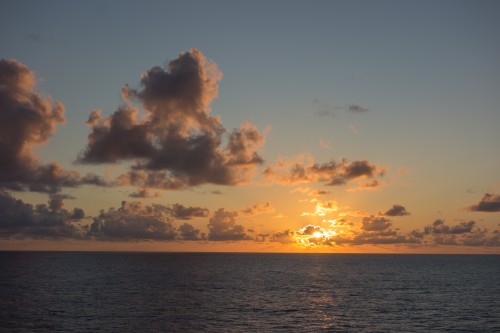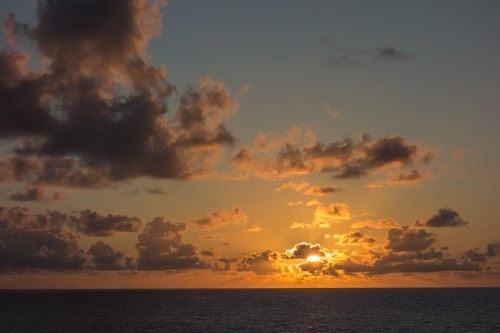

We slept in all the way until 6:30 this morning. We surely could have slept for longer, but once again the sun was sneaking in, past the drapes, so it was tough to stay asleep. Breakfast was much more leisurely, as we had no need to catch the first tender - or any tender for that matter. The ship puts together 4 page news leaflets every day, and today we looked for the first time. We realized after about 2 minutes that we haven't been missing much - political BS about private email servers, a third string quarterback being cut by the Eagles, and so on. After breakfast, we scoped out a couch near the pool bar in the shade, and then set up shop. We tried to catch up on the trip log, as the various days on the islands were already running together. We ended up getting distracted, however, talking with Chris, Patricia and John about bulldogs and travel. Soon the laptop battery was running low, so we plugged the laptop back in and played Scrabble for about an hour, until the laptop was charged again. Around 12:45 the area around the pool bar cleared out, as everyone realized around the same time it was lunch time. We had a nice lunch at La Verandah, with a bit of a sideshow with 8 of the Frenchies trying to eat together where there wasn't really room to do that. They just moved tables and chairs around until they got the seating they wanted, there just wasn't much room to get around the tables they set up without being right up against the outer railing. Whatever.
At 2pm we went to another talk by Mark Eddowes, this time about the Maohi people. Maohi is the term that refers to the indigenous people of the Society Islands. Once Europeans showed up and spread disease, the population dropped precipitously from 150,000 or so in 1767 to 10,000 by 1800. A lot of the leeward society islands seem to have been settled from Tonga and Samoa, as the names are close to the names of prestigious islands in Tonga and Samoa. Presumably junior members of prestigious families (e.g., second and third born sons that weren't happy with the line of succession) moved from Tonga and Samoa because of impending or actual conflict. The original name of Raiatea, Havaiki, comes up all the time in oral histories of the Maori in New Zealand, Hawaiians, etc., making it seem as though it was the "main" or sacred island of the Societies, and probably the island where the main chief lived. There are no archaeological examples of the huge canoes that were used, but composites of several oral descriptions is a huge double canoe with multiple sails, very deep to store materials, animals, people.
While there was a great amount of travel at the beginning of exploration, over time the travel between the islands lessened, and each group (Marquesans, Maori, Hawaiians, etc.) started developing their own language, own culture, own way of life that distinguished them from each other. According to Cook, who was able to compare and contrast all of the various cultures on his three voyages to Polynesia, the most proficient seafarers were the Tongans (who had ships that could hold 300 people), the Hawaiians, and the Maohi of the Society Islands. Of these groups, the Maohi were the ones that traveled outside of their own archipelago the most frequently. For example, the fish hooks used by the Maohi don't come from the Society Islands, but rather from surrounding archipelagos. The Maohi would trade stone tools for pearl shells in the Toumotus and other places. Besides Hawaii, which had something close to a "king," the Society Islands and everyone else had clans with pure bloodlines, but each island might have 3-4 families that were of relatively equal rank, and intermarried with each other.
Polynesians are "shame-based" societies, in that everyone tries to avoid embarassment and shame, to keep the family name in good stead. Cook and others noticed that the people from the main tribe were taller than others, as they were the only ones who had regular access to protein such as pork. For others, pork was taboo, and was eaten only at festivals where the taboo was temporarily lifted. Each tribe would live in a valley, stretching from the top ridge all the way down to the ocean. This whole area would be communal area for the tribe. The chief would act as a steward of the land - there was no "ownership" of land - and distribute parcels to each family of ordinary people. Families would tend to their land for themselves, but would also give quite a bit back to the chief who would then redistribute to the group as appropriate. People tended to live futher up the hillside, where there was more fresh water, the temperature was cooler, and ground was easier to defend.
Mark explained a bit about sacrifices in the Society Islands. This happened once a year, and usually involved taking of six boys from another tribe. On Tahiti, Cook saw one of these at Teahupoo. Teahupoo means "pile of skulls" in Tahitian, so remember that the next time you're watching a surf competition from Teahupoo on TV. The Mahu, the males who gave up their gender, would become subject to the all of the various taboos that applied to women but not men, and also would dress and act as females after a special ceremony. Interestingly, women in Tahiti did not have long hair until after the Europeans arrived. While so many people died from disease after the Europeans came, those that survived passed on resistance to disease to their offspring, so people today are generally healthy and with good genes.
After the talk we went back up to the pool bar, and the spot we had been in all morning was available again, so we plopped down to enjoy the afternoon. Around 4pm we finally caught up on the trip log, which meant it was Mango Daiquiri time. It turns out that Mango daiquiris aren't very good when made with boxed juice instead of ripe fruit. We chatted with Janine and Chris and Patricia about excursions on the Society Islands, and what happens the last night when we are back in Papeete. We got cleaned up a little earlier than normal, then went up to La Palette for sunset. It was a good sunset, which was nice to have on a day where nothing else was going on. We watched the Santa Rosa band play at La Palette - lots of Bob Marley songs tonight. We then headed down to Le Etoile for dinner, which was good as usual. We grabbed one drink at the Piano Bar, and met Jeff and Anita, who actually are on their honeymoon. We laughed at the fact that no one asks them that question, but we get asked several times a day, even though we've been married 15 years. We also met Patricia (a different Patricia), who lives in Michigan. She was watching her husband do well at the blackjack table; the table was far busier than other nights, so we can only assume the dealer was having a bad night (well, bad for the ship, good for the passengers).
 |
 |
At 10 we went up to karaoke night. It was busier than the previous time, and we actually got in a couple of songs - Hey Jude, Sweet Caroline, Copacabana, and Livin on a Prayer. We were predictably awful - neither of us can sing - but it was still fun anyway. After it ended, we chatted with Paul and Louise for a while, then made our way back to the room a little before 1. One of these days we're going to need to get some R&R on this trip.